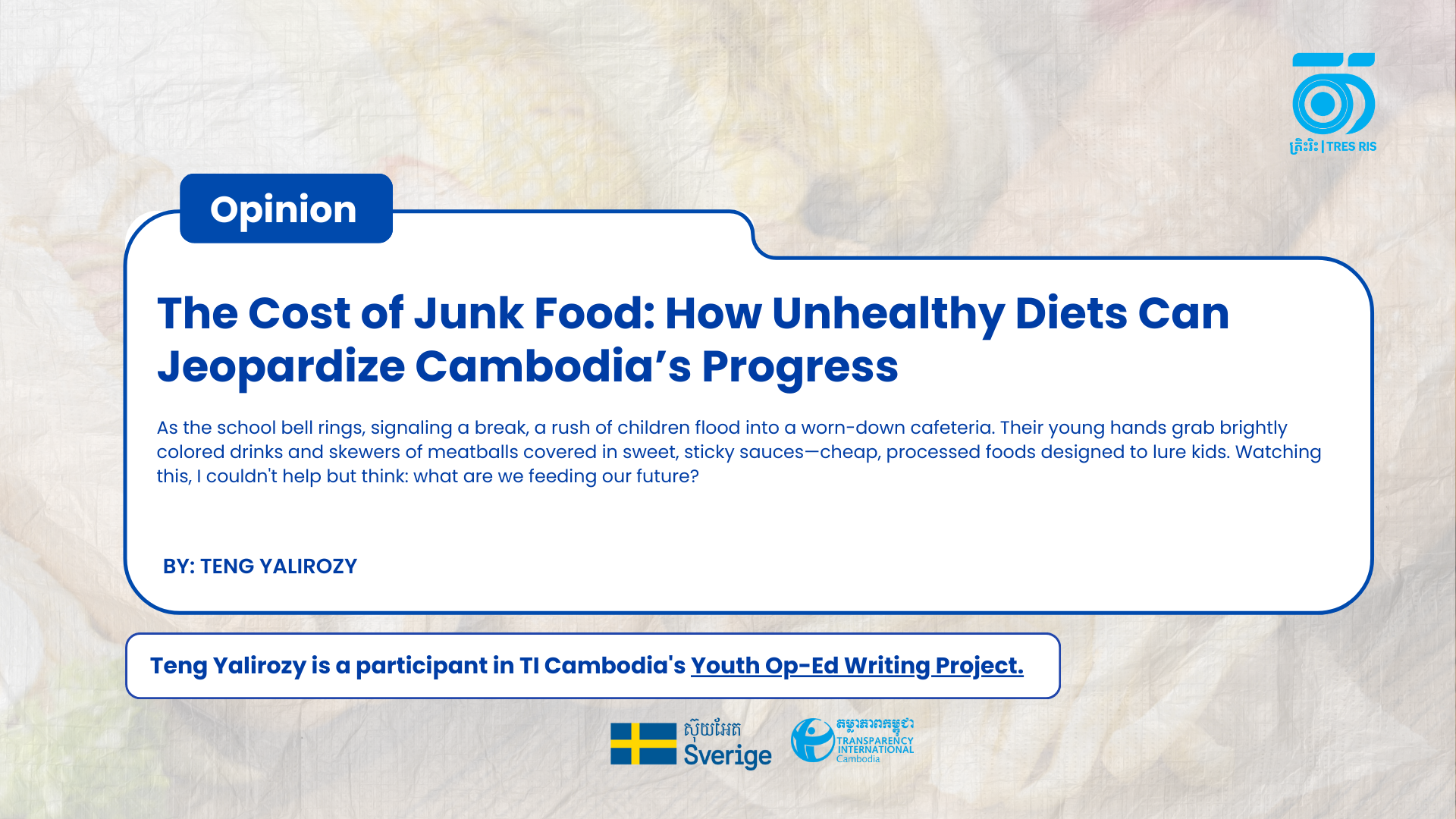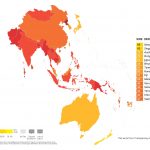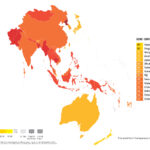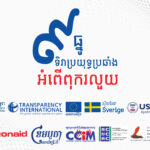The Cost of Junk Food: How Unhealthy Diets Can Jeopardize Cambodia’s Progress
By Teng Yalirozy*
In this op-ed, Teng Yalirozy highlights the growing concerns around childhood obesity and malnutrition in Cambodia and emphasizes the importance of promoting healthier diets in schools to support the country’s future development.
As the school bell rings, signaling a break, a rush of children flood into a worn-down cafeteria. Their young hands grab brightly colored drinks and skewers of meatballs covered in sweet, sticky sauces—cheap, processed foods designed to lure kids. Watching this, I couldn’t help but think: what are we feeding our future?
Cambodia boasts a young population – 70% under 30, with six million children (https://worldschildrensprize.org/cambodia#:~:text=6%20million%20children,are%20under%20five%20years%20old). These children are the cornerstone of the nation’s aspirations to become an upper-middle-income country by 2030 and a high-income one by 2050. The government also aims to graduate from Least Developed Country (LDC) status by 2029. But this ambition may be hindered if we do not address a growing public health crisis—unhealthy diets.
Children’s unhealthy diets, packed with processed foods and sugary snacks, are creating long-term health risks. Left unchecked, rising rates of childhood obesity and chronic diseases like diabetes could erode the productivity and well-being of our future workforce.
Cambodian schoolchildren face a dual burden of malnutrition: on one hand, high rates of micronutrient deficiencies, and on the other, a growing trend of obesity (https://cambodia.un.org/en/198886-wfp-and-government-cambodia-launch-behaviour-change-campaign-improve-nutrition-among). A 2014 study revealed that 50 percent of primary school students lack essential nutrients like zinc, iron, and folate—deficiencies that stunt growth and impair cognitive development. Exacerbating this issue is the easy availability of unhealthy snacks in and around schools (https://scalingupnutrition.org/news/food-systems-transformation-cambodia).
A 2023 study (https://www.phnompenhpost.com/national/healthy-food-guidelines-primary-schools-drawn) by Helen Keller International found that many Cambodian children are given pocket money by their parents to buy snacks, but unfortunately, these snacks are often unhealthy. High in sugar, salt, and fat, and low in essential nutrients, these foods foster poor eating habits that can carry into adulthood, leading to health problems like malnutrition, anemia, and impaired cognitive development (https://www.phnompenhpost.com/national/healthy-food-guidelines-primary-schools-drawn).
Adding to these concerns is the alarming rise in childhood obesity in Cambodia. The same study by Helen Keller International revealed that more than a quarter of children aged 5 to 19 are now overweight or obese, and this trend shows no sign of slowing.
My visits to floating villages on Tonle Sap Lake confirmed this. Children, smaller than expected for their age, munched on sugary treats and processed foods. These children were visibly smaller than their peers in the cities, perhaps a stark reminder that their poor diet was hindering their growth.
Cambodia is not alone in facing this challenge (https://www.emro.who.int/noncommunicable-diseases/causes/unhealthy-diets.html). Globally, both malnutrition and obesity are on the rise. Between 2000 and 2022, the number of children under five affected by overweight increased from 33 million to 37 million (https://data.unicef.org/topic/nutrition/malnutrition/). Obesity in children has long-lasting effects, leading to chronic health problems such as type 2 diabetes, heart disease, and even cancer (https://nutritionsource.hsph.harvard.edu/obesity/). Countries with unhealthy populations face not only a decline in economic productivity but also soaring healthcare costs, straining already limited public resources.
Noncommunicable diseases develop gradually due to poor diets and unhealthy lifestyles, and these conditions are becoming more prevalent among children (https://www.childfeedingguide.co.uk/tips/common-feeding-pitfalls/unhealthy-food-preferences/). Research shows that early consumption of unhealthy foods—high in sugar, salt, and unhealthy fats—can lead to issues like obesity, behavioral problems, and weakened cognitive function (https://www.childfeedingguide.co.uk/tips/common-feeding-pitfalls/unhealthy-food-preferences/). These problems don’t just impact individual children; they have national consequences.
Other Southeast Asian countries are already grappling with this dual burden (https://www.downtoearth.org.in/news/lifestyle/southeast-asia-s-double-whammy-child-malnutrition-and-obesity-53427). In Thailand, for example, adolescent fast food consumption is the highest among 54 low- and middle-income countries (https://www.unicef.org/eap/media/9581/file/Controls%20on%20the%20marketing%20of%20food%20and%20non-alcoholic%20beverages%20to%20children%20in%20Thailand.pdf). This rise in obesity not only threatens the health of the population but also contradicts Thailand’s commitment to the UN Convention on the Rights of the Child (UNCRC), which includes addressing malnutrition in all its forms.
Thailand, however, is taking action. It has implemented the Act on Control of Marketing of Infant and Young Child Food, and a draft regulation to restrict the marketing of unhealthy foods and beverages to children is in the works (https://www.unicef.org/eap/media/9581/file/Controls%20on%20the%20marketing%20of%20food%20and%20non-alcoholic%20beverages%20to%20children%20in%20Thailand.pdf).
Cambodia, unfortunately, appears to lag behind. Despite the Ministry of Education’s periodic bans on unhealthy snacks and energy drinks in schools, these initiatives appear to be inadequately enforced. Unhealthy foods continue to be sold unchecked, especially in rural areas, where awareness and enforcement are minimal. Some Cambodian parents, however, are beginning to take notice of the impact of these diets and are demanding stricter regulations (https://kiripost.com/stories/cambodia-parents-demand-unhealthy-food-ban-in-schools-phnom-penh).
Cambodia’s young population holds the key to its development, but their future is threatened by the growing epidemic of unhealthy diets. If the country is to succeed in its ambitions to become a middle-income nation, the government must take immediate, decisive action to curb the sale and consumption of unhealthy food. This could include developing national policies to regulate foods and beverages high in sugar, salt, and unhealthy fats and strictly enforcing these rules in schools. But this isn’t just a government issue. Parents, educators, and the broader public all have a role to play in raising awareness about the importance of healthy eating.
A healthy diet today means a stronger, more productive workforce tomorrow—one that can fully realize the country’s development ambitions.
* Teng Yalirozy is a participant in Transparency International Cambodia’s Youth Writing Op-Ed Project. The opinions expressed in this article are those of the author and do not necessarily reflect the official position of TI Cambodia or its funders.
 English
English





